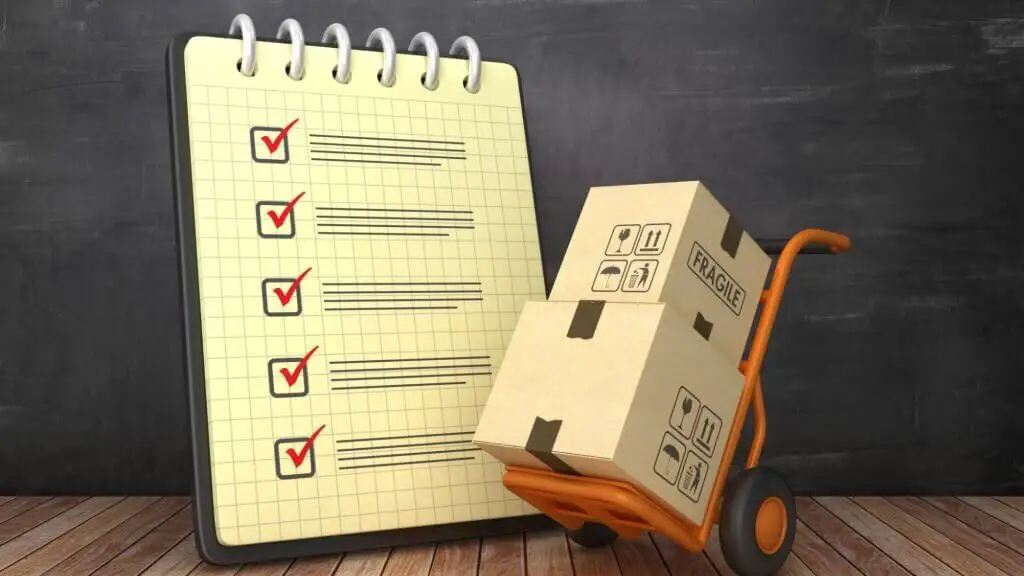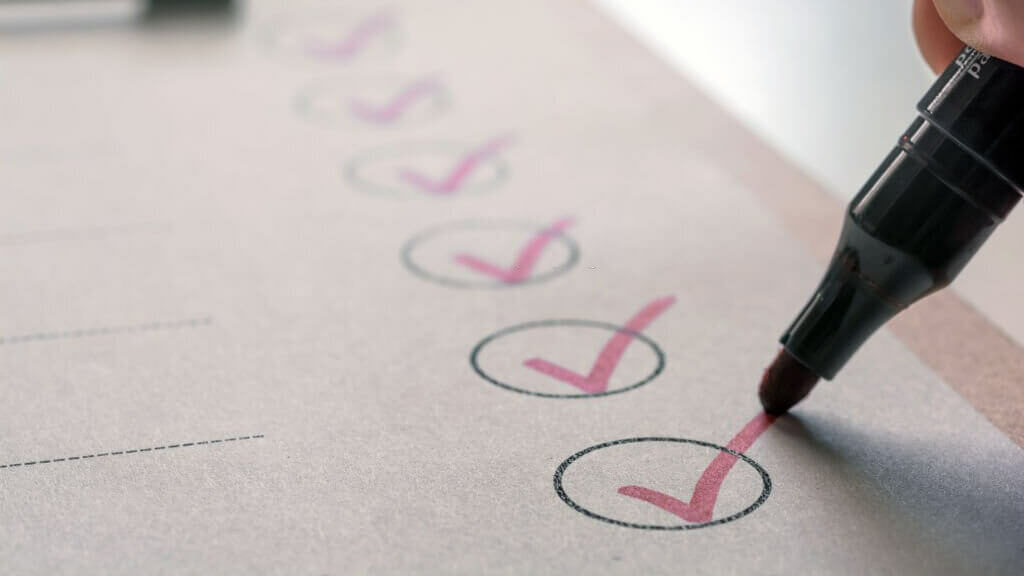A checklist is defined as a list of items that may be checked off as finished or noted. A checklist could be used when you have ten things to perform at work, and you write a list of them all and check them off as you do them.
There is no such thing as a flawless checklist, but if you follow these basic steps, you should create one that is both thorough and trustworthy.
You should double-check that you are meeting the intent of each item on your checklist and, if necessary, take notes, photographs, audio, video, or audio recordings.
You may also manage your checklists and audit and inspection results using our fantastic iPad and iPhone app.
Is There A Checklist For Moving?
You must plan for every element of your relocation. You’ll be glad you began early and have this comprehensive moving checklist to keep track of everything on your to-do list.
Moving can be a stressful experience for many people, so making a moving to another state checklist to ensure you’re organized and prepared might help relieve some of the pressure as moving day approaches.
Determine your real relocation date, and when you take ownership of the property, you will be moving into as a starting point.
Is There Going To Be Any Property Overlap?
If that’s the case, you might be able to perform some prep work at the new place to make moving day go more smoothly.
How do you make a move list?

1. List all the requirements
Each item on your checklist must be comprehendible by the individual who will be utilizing it.
What good is a checklist if no one can follow it? Each item should be as brief as possible to make it as simple to use as feasible.
2. Group Your Items by category
Categories aren’t necessary for short checklists, but larger ones can rapidly become overwhelming.
You may quickly go to the checklist section that you are working on by categorizing your items. Don’t over-organize, and be sure to use basic category names so you can readily locate the item on your checklist.
3. Pack each item usable
This is a critical point. The power of a checklist is that it allows you to take action on each item while also ensuring that you meet the item’s objective.
You can make your checklist considerably more powerful by splitting down items into actions.
Rather than saying things like “Check Safety Exits,” break it down into smaller chunks like “Check safety exits are free of obstructions,” “Check safety exit signs are lighted,” and “Check safety exit doors open correctly.”
4. Don’t Skip Anything On The List
If you miss questions or categories on a checklist, what good is it? You must utilize your checklist completely each time; if you find yourself skipping questions, you should consider whether the checklist is correctly designed for your needs.
5. Ensure Your Notes are used to improve performance
Some checklists are simply checkboxes to be checked, but you can surely create more comprehensive checklists that allow you to specify follow-up tasks.
You can respond affirmatively (yes), negatively (no), not applicable (n/a), or mark as incomplete for each item. It’s also a good idea to take notes on what may be done better.
Photos, video, or audio evidence should be used to supplement your checklist results if applicable.
Finally, you can always figure out what measures to take to remedy any issues you’ve encountered. Remember that a checklist should be refined over time as you utilize it.
Best Checklist Schedule for Movers
Creating a clear strategy is the first step toward moving. You’ll need to know when you want to move (or at least when you’ll need goods delivered), how much money you have, and how you’ll get to your new house.

All of these factors can influence the remainder of your choices. It’s a good idea to keep a move file as you gather information, so nothing gets lost.
Please keep track of quotations, receipts, and other essential papers with it. You can make a Moving checklist Excel for better understanding.
8 Weeks Before You Move
- Begin by walking through your house and decluttering each room. Make a list of what should be kept, sold, donated, or discarded. Get rid of whatever you don’t need, so you may only bring what you truly want or need with you.
- Secure your movers after you have a good idea of what you’ll be relocating. It’s a good idea to acquire an estimate depending on what you’ll need to be transported ahead of time.
When it comes to the sorts of boxes you’ll need, the number of trucks you’ll need, and the estimated time and cost of moving your things, our in-house moving specialists are always pleased to help. - Determine whether you require additional assistance with packing, unpacking, or even storage, based on the property you are relocating to and the decluttering work you’ve done around your house.
We also provide storage options that may be conveniently integrated with your relocation. - Make a digital file with all of the pertinent facts about your relocation. This should contain information about the new home, the one you’re leaving, the day and time the movers will arrive, as well as any pre-move cleaning services or utility set-ups.
- Suppose you’re relocating to a new location. In that case, it’s a good idea to start looking for local physicians, dentists, clubs, fitness facilities, or accountancy services that are within reasonable driving distance of your new house.
6 Weeks Before You Move
- Notify your local post office of your relocation. Get your new address and, if necessary, send out change of address cards or email address update notifications.
- Begin packing
- Disconnect all of your utilities, including your phone, cable, water, gas, and electricity.
- Check with the phone company at your location to see whether service can be set up before you arrive.
- Request that your bank transfer your accounts to the branch closest to your new residence.
- Any gyms or other associations should have their membership information updated.
What should I do in the 30 days leading up to my move?

1. Select a moving company
Choose a moving company and receive formal confirmation of your relocation date, price, and other details.
2. Start Packing
Begin by packing the items you use the least, such as the waffle iron and croquet set. Make a list of things of exceptional worth that may require additional insurance from your moving company while you’re packing.
Anything worth more than $100 per pound, such as a computer, must be declared in writing.
3. Label
Label and number each box with the contents and the room it will be delivered to. This will assist you in keeping track of your possessions. Items you’ll need straight away should be packed and labeled in “essentials” boxes.
4. Separate Valuable Items
Put valuables like jewelry and essential documents in a secure box that you’ll bring with you to your new house. Make sure you include the estimate from the mover in this area. On moving day, you’ll need it as a reference.
5. Change Official Address
Fill out a change-of-address form at your local post office or online at usps.gov. However, if some stragglers remain, it’s usually a good idea to ask a close neighbor to keep an eye out for mail after you’ve gone.
Please make contact with them two weeks following the relocation, and then again two weeks later.
6. Notify Important Organizations
Banks, brokerage firms, your employer’s human resources department, magazines and newspapers you subscribe to, and credit card, insurance, and utility providers should all be informed of your relocation.
7. Collect Medical Records
Obtain copies of your medical records or arrange for them to be delivered to any new healthcare providers. Request a recommendation.
4 Weeks Before You Move
- Plan a garage sale or sell your goods online if they are no longer needed. This will assist in the removal of some clutter.
- Transfer your fire, theft, and other insurance policies to your new address.
- Make sure your auto insurance is up to date with your new address.
- To guarantee that you move into a clean and sanitary environment, hire house and duct cleaning services for your new property.
- Start sorting and packing stuff that you don’t use daily.
What should I Do Two Weeks Before My Move?

Obtain A Day-Off From Work
Notify your boss that you will be supervising the relocation and will require the day off.
Tune-up
If you’re relocating to a new climate, take your automobile to a garage and ask the technician what services could be required.
Empty your Safe Deposit Box
Remove the contents of your safe deposit box and place them in the secure box you’ll take with you on moving day if you’re changing banks.
2 Weeks Before You Move
- Cleaning rugs and draperies is a good idea. Rugs should be coiled and wrapped. Make extra copies of your floor plan for your new house.
This will come in handy on “move-in” day, as you’ll be able to name your boxes according to the rooms they should go into. - Plan a going-away party for your children and their friends if you are moving to a new neighborhood. Except for the necessary goods, you’ll need access to finish all of your packing.
- Separate any food, plates, and utensils you’ll need over the next several days. On moving day, make sure to pack them. Remove everything from your refrigerator, freezer, and pantry.
Between now and moving day, cook and prepare as many meals as you can. Donate any leftover canned or frozen items to the local food bank. - Make sure all of your clothes are clean and don’t forget to pick up any dry cleaning. Organize all of your moving and travel paperwork, as well as any valuables you’ll be transporting on moving day. These goods should always be carried with you.
- If you’re relocating to a new climate, take your automobile to a garage and ask the technician what services could be required.
- Attempt to complete your general packing a few days before your scheduled move. Then fill bags with enough clothing to last a few days for everyone in the family.
1 Week Before You Move
Remove any curtains, blinds, shelving units, or other things attached to walls or fixtures that you will not be keeping. Any fixed carpets that need to be relocated should be unfastened.
Set aside and identify any goods that you do not wish to be moved, such as baggage. Prepare your vehicle for the move. (Pack goods you’ll be moving.)
Day Before

Clean Your Refrigerator
If you’re taking your refrigerator with you, be sure you empty, clean, and defrost it at least 24 hours ahead of time.
Double-Check the details
Confirm the moving company’s arrival time and other details, and double-check that you’ve written down accurate directions to your new house for the crew. Include your phone number and any contact details.
Plan For Payment
Get a money order, cashier’s check, or cash for payment and tip if you haven’t already agreed to pay the mover using a credit card. If the staff has done an excellent job, a tip of 10% to 15% of the total price is appropriate.
You might tip each mover up to $100 if your relocation was particularly tough. Remember that refreshments are always welcome.
On Moving Day
Verify The Moving Truck/ Vehicle
Please verify that the moving truck that arrives belongs to the company you hired: The number painted on its side by the USDOT should correspond to the number on the estimate you received. Scams aren’t uncommon.
Take Inventory
Sign the bill of lading/inventory list and preserve a copy before the movers leave. Make a list of everything you own. You’ll be able to keep track of what you own and what the movers are moving this way.
Also, have a look at your driver’s inventory sheet. Make a note of everything that is missing or damaged ahead of time. For liability and insurance concerns, it’s also a good idea to snap photographs of sensitive goods like refrigerators or lights.
Do A Final Sweep of the House
Make one last sweep of your home before you leave to prevent leaving anything behind. Don’t forget to check your bathtubs, washers, dryers, kitchen cupboards, and other hard-to-reach places.
Hand over the house key to the landlord
Unless you intend to return after the relocation to finish off any loose ends, give your landlord or new owners the keys.
After Moving Day
If you need to store any items, let the storage facility know what to store or remove from your unit. Ascertain that utilities will be connected on schedule.
Ascertain that all boxes and furniture have been carried into the house and that if unpacking services are necessary, you are available to assist in determining where items should go.
2 Weeks After You Move

Un-Pack
Allowing yourself to be overwhelmed by the process of unpacking is not a good idea. Begin with your luggage contents, cookware, bed linens, and other necessities. Go room by room until you’ve finished unpacking the remainder of the house once you’ve unpacked these key goods.
Clean the New House
There’s nothing like a new (and clean!) house for a fresh start. Give your house a thorough cleaning within the first week after you’ve moved in.
All surfaces must be mopped, vacuumed, and dusted. If you don’t have the time, consider hiring a professional cleaning crew for the first month.
Check Security Deposit
If you rented your previous residence, inquire about your security deposit refund status with your former landlord. Make sure your landlord knows your new address, so your check does not go missing in the mail.
Explore The Neighborhood
Are you new to town?To acquire a feel for the new neighborhood, take a walk, drive, or ride your bike about it.
By exploring the neighborhood, you may locate neighboring grocery shops, parks, schools, museums, libraries, hardware stores, and pharmacies. Learn more about the people and places in your community.
Call Pest Control
Make an appointment with a professional exterminator to inspect your new house for any potential insect issues.
1st Month After

Change Your IRS Address
Those who relocate should update their information with the IRS to ensure that tax refunds and communications are received. You can do so by putting the new address in the relevant areas on your tax return or by submitting a change of address using Form 8822 at any time.
Obtain New Domicile
Are you relocating to a new state?
For tax purposes, you may need to create a legal domicile. Check out the state’s official government website for information on the different options to establish residence in your new state.
Update Drivers License
You’ll need to acquire a new driver’s license from your state’s DMV if you have a car. In many states, new residents must get a driver’s license within a certain amount of time after moving.
A current driver’s license, proof of domicile, social security number, and another form of identity are all likely to be required.
Register for voting
To change your voter registration, go to your local town hall or phone them. Tip: You may be able to register to vote and establish residence on the same day you go to the DMV to acquire a driver’s license.
Baby-Proof The House
Is it possible to relocate with a baby?
During the first few weeks, be sure you baby-proof the house to ensure that your child is safe and secure in their new surroundings. Remove any potentially hazardous packaging items as quickly as possible.
You may also use baby gates to prevent stairwells and cover electrical outlets near the floor with outlet covers. Check out this page for more information about relocating with a baby.
Are you moving with a baby?
Make sure you baby-proof the home during the first few weeks to ensure that your kiddo stays safe and sound in the new digs.
Start by removing any potentially dangerous packing materials as soon as possible. You can also set up baby gates to block stairs and place outlet covers over electrical outlets near the floor. For more tips on moving with a baby, check here.
Meet the Neighbors
Introduce yourself to your new neighbors once you’ve moved in. Don’t be scared to say hello by ringing the doorbell. The majority of individuals will appreciate the gesture, and you could even make some new friends as a result.
Register Your Pet
While state laws vary, many places require pet owners to register their animals and pay for a license within one month of moving.
If you’re relocating out of state or across county borders, you should consider registering your pet in the weeks after the relocation. This is primarily to guarantee that animals obtain the required vaccinations for public safety.
Book an Electrician
Find a reputable local electrician to inspect any outlets that aren’t working or are overheating in your new home. They should also be able to help you hang light fixtures and determine if your electrical panel needs to be upgraded.
Conclusions
Schedule the move as soon as possible. The more you wait, the more important availability becomes. And you won’t be able to make any further plans until you’ve resolved this issue. You’ll feel better if you contact a moving firm.
Unpacking is made simpler by paring down goods, but there are times when you need to get things into boxes.
Rather than wasting time going through everything, concentrate your efforts on properly packaging the things. Don’t worry about it, start packing.
Planning gives you power. Some aspects must be taken care of right away (like transferring school records, connecting utilities, and arranging to park).
Set up a few hours to complete all of these tasks at once. Also, do as much as you can on the internet. It’s always a bonus to spend less time on hold.
Don’t worry if you’re short on time. Some tasks can be postponed until after the relocation. Accelerate the procedure. It’s hard to think of everything on such short notice.
You have to roll with the punches occasionally, whether it’s picking a motel on your route to your new home or rushing to the shop for extra packing goods. Don’t look back after you’ve made a decision.
